- Home
- Anne Bennett
Pack Up Your Troubles Page 2
Pack Up Your Troubles Read online
Page 2
‘Away out of that, Billy and Jane. Have you not a word of welcome for your cousin?’
The children got to their feet reluctantly. They knew the young girl before them was the one their parents had argued long and hard about. In that house, it was often hard to know whether it was better to please their mother or their father. It was impossible to have a situation that would please the two of them.
‘Hello,’ Billy said.
It was a lacklustre greeting, and Billy saw his father frown on him. He didn’t care much. His father’s hands might be harder than his mother’s, but he never used them on him, whereas his mother . . .
Jane was older than her brother and thought this welcome was a shame for the girl. Her dad had said Maeve was eighteen, but Jane thought she didn’t look it, so she smiled and said, ‘Hello, I’m Jane. D’you want me to help you take your things up to the attic where you’ll be sleeping with me and Billy?’
‘That would be nice,’ Maeve said awkwardly, not sure whether this was the right response or not. She glanced across at her uncle, who nodded at her and she picked up her case. Jane had picked up the other bag, opened the door to the stairs that went off from the living room, and led the way.
Barely had the door closed on the girls when Maeve heard her aunt’s voice for the first time. It rose in an angry screech that she must know would be perfectly audible to them both. Maeve was to find out that in a back-to-back house, if you turned over in bed, the walls were so thin, half the street would be aware of it.
‘How long has she been foisted on us?’ Agnes demanded of her husband.
‘Agnes, we’ve discussed this.’ Though her uncle’s voice was muted, Maeve had not to strain to hear his words. ‘Till she gets on her feet, that’s all.’
‘Till she gets on her feet,’ Agnes sneered. ‘And how am I to feed her on the pittance you bring home?’
‘Surely to God we can do so for a little time. She has a job she’ll start in a few days and then she’ll pay her keep. Isn’t she my own sister’s child?’
‘Aye, and your sister has a tribe of them at home, by all accounts,’ Agnes cried. ‘Are we to fund the whole of them over here one at a time?’
Jane placed the bag on the attic floor. She was flushed with embarrassment, but no more than Maeve was herself. She knew her face must be brick red, for she felt her cheeks burn with it. She’d been going to ask the child why her mother didn’t want her there, but the answer was now apparent.
Then she heard Agnes’s voice again. ‘Are they to be hanging to your coat-tails all the days of your life? My family don’t make demands on you like this.’
‘Your family live around the doors, woman.’ Michael’s voice was loud and angry. ‘They’re never away from the place. God knows, I’ve not seen my family since the day I left.’
Jane looked at Maeve and said, ‘Mom’s worried about money. It ain’t just you, honest. See, our dad was put on short time three weeks ago.’
‘Short time?’
‘He only works three days a week, like,’ Jane explained.
Maeve sat down hard on the bed. Her uncle had never told them that, though he’d written and told her about the job in the café just before she’d left. In fact, she thought, looking around the bare attic, what he had told the Brannigans had not been totally true.
Maeve was glad that she had a bag packed with goodies from the farm, and the five-pound note her mother had pressed her to take.
‘Food will always come in useful, especially fresh stuff,’ Annie had said. ‘Though Michael will hardly need the money – him with his fine job and grand house – I’ll not have it said you’d go anywhere and not offer to pay your way. Give Michael’s wife the money and leave it up to her what she’ll do with it.’
And Maeve knew, as she sat in that attic, that both the food and the money would be welcome, for the fine job was now not so good, and the grand house had never been. The downstairs room, though, was well furnished. Two upholstered armchairs were drawn up before the fireplace and two small stools stood in one corner. There was also a drop-leaf table and four chairs with padded seats, and a matching sideboard. Even the blue-patterned linoleum was not pitted or ripped, and the rug before the fireplace looked fluffy and expensive.
So, once there had been money. Not money enough, perhaps, to lift the family out of the house that had given Maeve such a shock that day, to a better one. But there had been money enough for furnishing at least the one room. Maybe their bedroom too, for though they’d passed her uncle and aunt’s room on the first floor, Maeve wouldn’t have dared, even if Jane hadn’t been with her, to open the door and peep inside. The attic room, with its two iron bedsteads and bare boards, had not been touched much, though there were crisp white sheets and clean blankets on the beds.
‘That’s why our dad was able to meet you today, like,’ Jane said, breaking into her thoughts. ‘’Cos he’s on short time.’
And Maeve had thought he’d taken a day off because he could, because he was one of the bosses – a foreman or some such – as Michael had indicated in his letters home. There had been no preparation for a man who worked only three days a week. Suddenly she felt sorry for her Aunt Agnes. Already managing on little money, she had now to feed another mouth.
She took off her coat and hat and laid both on the bed, then picked the bag up and said to Jane, ‘I have some things here to please your mother. I think she’ll be happier when she sees them.’
It had grown quiet downstairs and though Maeve knew it was probably the uneasy silence of an argument not resolved, she was still grateful for it. She took the parcel of food downstairs and presented it to Agnes, together with the five-pound note for her keep.
The change in Agnes was swift. She pocketed the money in her apron immediately and smiled at Maeve in a belated welcoming gesture. But Maeve noticed the smile didn’t reach her eyes and she knew then that Agnes would never be a friend to her.
The meal was fine and filling enough, with the bacon and eggs and soda bread and butter from home, together with chips from the chippy that Billy had been dispatched for, and everyone tucked in with a fine appetite.
Maeve made pleasant small talk for courtesy’s sake, but still couldn’t take to her aunt, and it was obvious that her uncle was almost afraid of Agnes. Maybe he had reason, but the fact remained that the man who’d warmly welcomed Maeve at the station did not exist in this house, and that realisation saddened her. She resolved to get a place of her own as soon as possible.
The children fired questions at her about Ireland, the homestead she’d left behind and their daddy’s family, and Maeve answered them as best she could. But the journey and the emotion of the whole day had tired her out, and she was glad when it was late enough to take to her bed. She lay beside Jane, and though Jane would have liked to talk more, Maeve was too exhausted and quickly fell into a deep sleep.
After a few fraught days, during which her aunt openly showed her displeasure in having Maeve there despite the five pounds, she was glad to begin work. Maeve was no stranger to hard work and she knew what the woman had told her on the train was no lie. Work was scarce, and she’d seen men, often extremely thin, and shabbily and inadequately dressed, lolling on street corners. She knew she was lucky to get a job, and probably wouldn’t have it at all if her uncle hadn’t asked for her. She had no wish for her boss to regret his decision to employ her and didn’t quibble at the hours he asked her to work, but because they were so long she asked him to let her know if he heard of some place nearby that she could rent.
Mr Dolamartis thought this over. He’d never had such an industrious little waitress, and so beautiful too; she certainly drew the men in. But the hours were often from early morning to late night, and though she never complained, he knew sometimes Maeve had trouble getting there in time in the morning and back at night to her uncle’s house.
Above the café there was a flat, basic and small, and though Mr Dolamartis had never used it as a flat but as a storer
oom, he knew he could use the room off the kitchen for storage instead, and give Maeve the chance of having a place of her own.
Maeve was thrilled. She wasn’t put off by the grime and neglect, and set to with a will to clean it all. Mr Dolamartis, amused at her industry, brought her some distemper to brighten the place up. There was a battered old sofa there already, and a table and chairs were supplied by the café. The bed was set into the wall of the living room and pulled out at night, but Maeve had no bedding, no crocks or cutlery, no curtains for the windows nor lino for the floor.
But though she’d paid over a good proportion of her wages to her Aunt Agnes, she’d kept her tips and sometimes they were sizeable. These she spent on essentials, then saved up for other household goods she wanted. She was often free in the afternoon for a few hours after lunch when Mr Dolamartis would take over. Then Maeve would usually take a tram to the city centre and stroll around the shops, enthralled by the choices available and particularly attracted to the Bull Ring, where she was able to find many of the things to make her flat more like home.
She joined organisations at the Catholic Church, St Francis’s, that she attended in Aston, in a bid to make friends with some of the younger parishioners. She’d been to the pictures and dancing with some of the young single Catholic girls on one of her rare evenings off, but she seldom went to her uncle’s house, knowing that she wouldn’t really be welcome.
TWO
Maeve met Brendan Hogan as she came out of Benediction one late summer’s evening in 1930, when she’d been in Birmingham less than six months. She thought he’d been to church too, but though he hadn’t, he didn’t enlighten her. He was struck by the beauty of the young woman and wanted to impress her, but though he never missed Mass or Communion – and certainly not confession, because that’s where all his sins were absolved – he hadn’t much truck with Benediction. He thought you could get too much of religion if you weren’t careful and, anyway, Benediction cut into his drinking time. He was actually on his way to a pub at Aston Cross, which he knew many ladies of ill repute frequented, when he bumped into the luscious golden-haired beauty who introduced herself as Maeve Brannigan. If the lovely lady wanted to believe he was a good clean-living Catholic boy, he wasn’t going to deny it.
Brendan was well muscled and handsome, with jet-black hair, a clear complexion, deep brown eyes and eyebrows that met across his broad forehead. Even the nose seemed to have little shape but sort of spread across his face, and his thick lips did not detract from his handsomeness, and Maeve Brannigan could not believe that such a man could possibly be interested in her.
But he was, and he smiled at her and said he was very pleased to meet her. He asked her name and Maeve told him without any hesitation, for she knew by the man’s voice that he was as Irish as herself and a good Catholic too, going to Benediction no less. She felt as if her heart had turned a somersault and Brendan knew he wasn’t going to walk away from this girl who attracted him so much.
‘Maybe you’d do me the honour of letting me walk you home, Miss Brannigan?’ he said, admiring to himself her soft lilting voice, and added with another smile, ‘My name is Brendan Hogan.’
Maeve was stunned. She wanted Brendan to see her home, but she wondered if she was being forward by accepting his offer. Maybe that’s how things were done in the cities? If she refused because she was afraid, then she might as well have stayed in Ireland, she told herself.
‘Thank you, Mr Hogan,’ she replied. ‘You can walk with me if you wish, but I don’t live at home. I work in Dolamartis’s café and live in the flat above it.’
Her own place, Brendan thought. This gets better and better. But he behaved impeccably, wanting to see Maeve again, and when he delivered her to the door of the café, he didn’t even kiss her. Never had the walk home appeared so short, Maeve thought regretfully, and never had she chatted in such an uninhibited way to someone she’d just met.
‘Can I see you again?’ Brendan asked, and Maeve thought her heart had stopped beating altogether.
‘Please?’ Brendan said, misinterpreting Maeve’s silence. He knew his cronies at The Bell public house wouldn’t believe this was Brendan Hogan of love-them-and-leave-them fame, but his body was on fire for Maeve Brannigan.
He was sure she wasn’t used to pubs, so their first date was to the cinema to see Charlie Chaplin. Brendan was the perfect gentleman, presenting Maeve with her first box of chocolates and taking her arm for the short walk to the Globe picture house at the junction of High Street and New Street in Aston. Maeve knew that was the entrance for the better seats. On her previous visits, when she’d gone on her own on a free afternoon, or with friends from the church, she’d bought cheap tickets from the little window in New Street. When she told Brendan this, he laughed and gave her a squeeze.
‘Only the best for my girl,’ he said.
Maeve felt dizzy. Was she really Brendan’s girl or was it just the way he talked? She began to think it meant nothing as the evening wore on, for Brendan made no move to take advantage of the dark to put his arms round her, or steal a kiss.
Never could Maeve imagine what self-control it took for Brendan to keep his arms by his sides. He scarcely watched the film because he was wondering if he’d given Maeve a good enough time for her to reward him with something else afterwards. With some girls a couple of gins did the trick, but he had an idea Maeve might be more difficult and he had no desire to frighten her off.
They left the cinema arm in arm.
‘Happy, darling?’ Brendan asked, and Maeve nodded. She was happy, she supposed; she’d laughed uproariously at Charlie Chaplin at the cinema and had been escorted there by a charming and very handsome man. But she was also confused, for the same man had said she was his girl, and just a minute before had called her darling and yet had scarcely touched her. She thought it a peculiar way of going on and she wondered if Brendan’s words meant anything at all.
It was brought home to her that they did when they got to Maeve’s door and he pulled her into his arms. His kiss made her feel weak at the knees and she responded readily to the embrace. Brendan was delighted; maybe it wouldn’t be so difficult after all. ‘Why don’t you ask me up for a nightcap, Maeve, my darling?’ he asked, raining kisses on her eyes, her cheeks and her throat till she was hardly able to think straight.
She nodded eagerly. After all, the man had given her a good night out and presented her with a box of chocolates of her very own, and it would be churlish and against all she had ever been taught to refuse him a cup of tea. She wasn’t anxious for him to leave just yet either and would love to talk some more.
It was when she realised that Brendan had neither tea nor talk on his mind that she became uneasy.
‘I’m sorry, Brendan,’ she said, pulling out of his arms with difficulty and regret. ‘I just can’t.’
Brendan was angry, but he hid it well. He told himself that Maeve was a decent girl, and he’d not met many of them, that was the trouble. She was not given to going too far on a first date. He’d just have to have patience.
‘It’s all right,’ he said.
Maeve saw the angry glint in Brendan’s eye and knew she’d put it there, but she couldn’t have gone further than they had. She’d let him touch and fondle her breasts, and that was bad enough and not something she’d ever have done if she’d been in her right mind and if Brendan’s kisses hadn’t made her dizzy and aching with longing. Well, she thought, I’ve kept my virginity, but lost my man because he’ll want no more to do with me after tonight.
But Brendan most decidedly did want to see Maeve again. She had few evenings off, though Brendan never complained about that. He had plenty of mates from the brass foundry where he worked who lived in Aston Cross and drank in the pubs there, and he’d stay there on Maeve’s evenings at work, arriving at the café at about half-past nine. Maeve closed up officially at ten, but if there were no customers she could close earlier and then all her time was devoted to Brendan. She never minded tha
t he was drunk. After all, she reasoned, what else was there for him to do? Nor did she mind the bottles of beer he would bring to wash down the little bit of supper she would always save for him.
‘Let me stay the night, Maeve?’ he’d pleaded time and again on these nights.
Maeve’s answer was always the same: ‘Brendan, I can’t.’
‘Oh, but you can, my darling,’ Brendan said one day almost a fortnight after their first date as he caressed and fondled one of Maeve’s breasts. ‘It would be so good. You’d enjoy it.’
Maeve didn’t doubt it. Already she was allowing Brendan more liberties than she’d ever dreamt of allowing anyone and, finding it so nice, it would have been easy, so easy, to let Brendan do what he wanted. But always her mother’s face would be before her, sorrow-filled, or the disapproving visage of the parish priest, and both images had given her the strength to pull back.
‘Wouldn’t your mother worry if you didn’t go home anyway?’ she asked Brendan one evening when he was again wheedling to spend the night with her.
He gave a bellow of laughter. ‘Maeve, I’m a big boy now. My mother has no say in my life. No one has. And that’s how it should be for you. You shouldn’t worry so much about other people. You should do what feels good to you.’
But despite Brendan’s urging Maeve wouldn’t be moved. Brendan tried harder than he’d ever tried with any other girl, and on Maeve’s rare evenings off he would forgo his pleasures at the pub and take her somewhere special. They went to the cinema twice more and even to the theatre once. The highlight of that visit to the Hippodrome in Corporation Street was to see a young Lancashire lass called Gracie Fields singing wonderful stirring songs that she urged the audience to join in.

 As Time Goes By
As Time Goes By A Little Learning
A Little Learning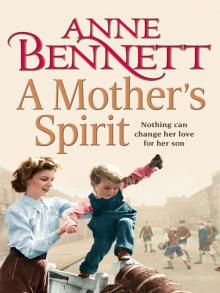 A Mother's Spirit
A Mother's Spirit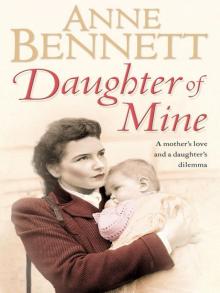 Daughter of Mine
Daughter of Mine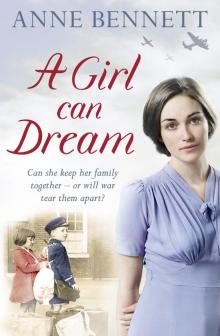 A Girl Can Dream
A Girl Can Dream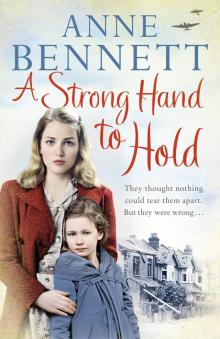 A Strong Hand to Hold
A Strong Hand to Hold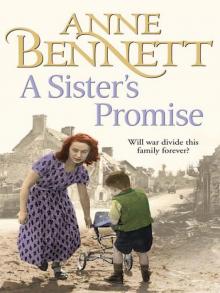 A Sister's Promise
A Sister's Promise To Have and to Hold
To Have and to Hold Pack Up Your Troubles
Pack Up Your Troubles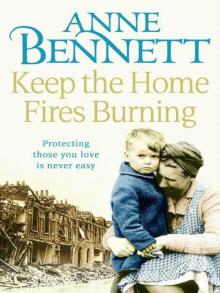 Keep the Home Fires Burning
Keep the Home Fires Burning Another Man's Child
Another Man's Child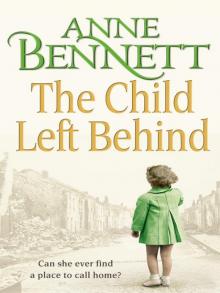 The Child Left Behind
The Child Left Behind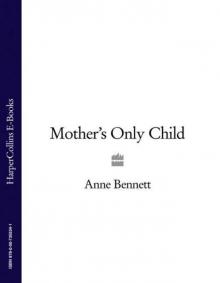 Mother’s Only Child
Mother’s Only Child Forget-Me-Not Child
Forget-Me-Not Child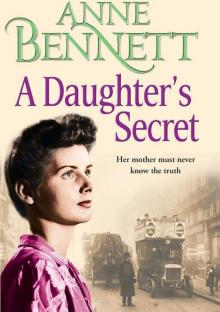 A Daughter's Secret
A Daughter's Secret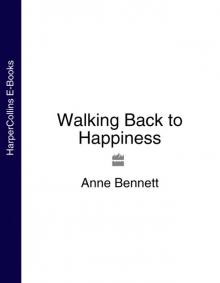 Walking Back to Happiness
Walking Back to Happiness Far From Home
Far From Home Till the Sun Shines Through
Till the Sun Shines Through